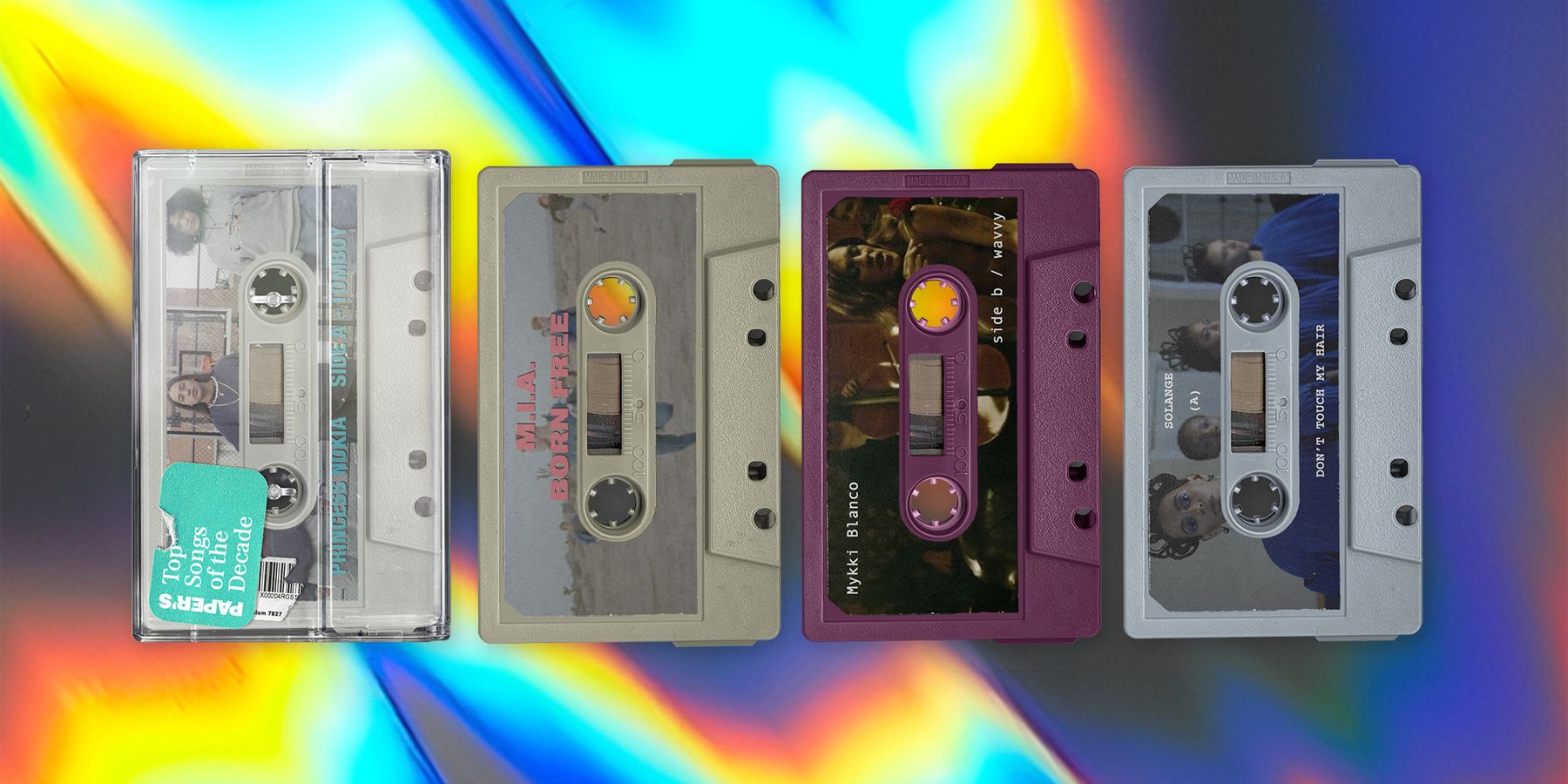
Trying to identify the best songs of any 10-year period, let alone one that saw such radical transformation, during which so much important music was released, is a deeply futile project and we certainly didn't attempt it. Instead, to commemorate the 2010s, we put together 10 songs that tell 10 different stories about this absurd, stupefying, enthralling decade. These songs never could have been made at a different time. Some sounded like, or said things we'd never heard before. Some of these songs made history. Others simply prevailed into obnoxious ubiquity. Some of these songs are brilliant, and others are deliciously stupid. One of these songs is a No. 1 hit, while others, very few people in the world have ever heard. Some simply make sense to us here at PAPER.
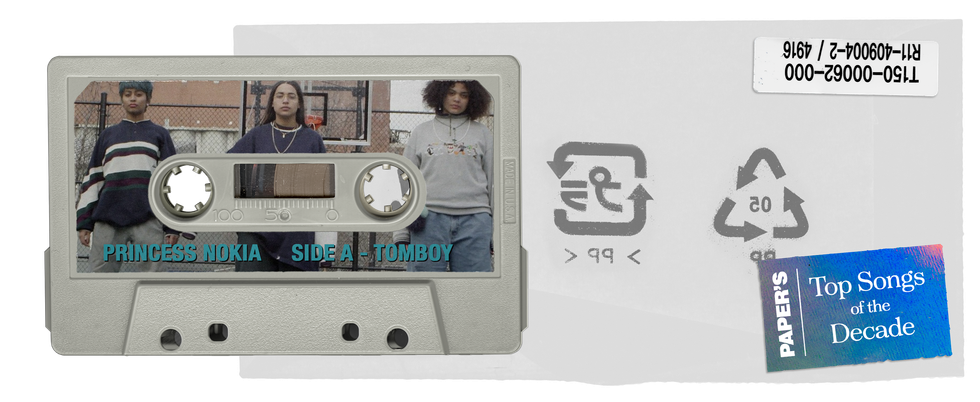
The drumroll and revving engine that opens Princess Nokia's "Tomboy" sends shivers up my spine: I know what's coming. The song is a punk rap assault that makes most "body positivity anthems" sound like nursery rhymes. "WITH MY LITTLE TITTIES AND MY PHAT BELLY/ MY LITTLE TITTIES AND MY PHAT BELLY," Destiny Frasqueri screams 25 times during the song. "Tomboy" is Frasqueri's manifesto of being hot shit, despite not meeting the heteronormative beauty standards of her own Boricua community in New York City, nor the mainstream. She commands her sexuality, brandishing it like nunchucks (or a dish of hot soup) towards any man or white person who'd cross her. There's room for others behind her line of fire: "I be where the ladies at," she spits, later adding: "You come to my party/ You gon' meet my army/ A room full of girls and we actin' real rowdy." Just like that, a song Princess Nokia woke up and "randomly wrote about having no titties" became a feminist fight song, taken up by women who, no matter what their bodies look like or where they're from, who crave the emancipation in Frasqueri's voice. — Jael Goldfine
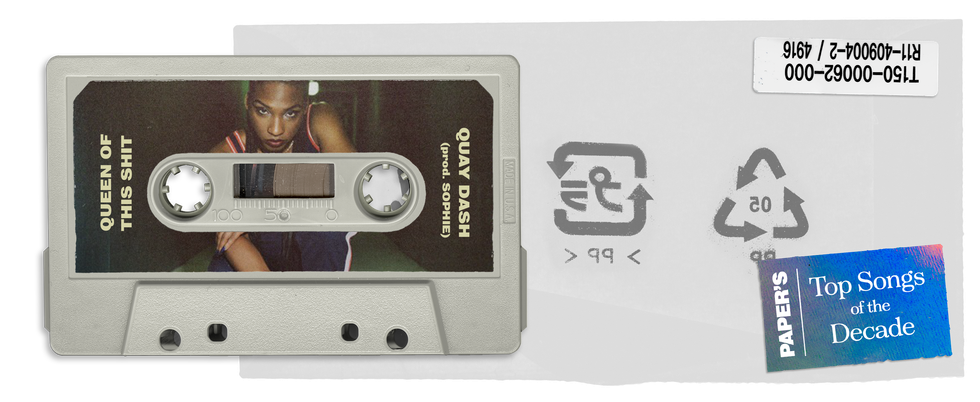
For the latter half of the decade, SOPHIE has been responsible for some of the most innovative, future-facing sounds to ever blow up a club's sound system. From Madonna and Vince Staples to Charli XCX, the producer's distinctive sonic vocab has reshaped the world of pop in its own plastic image. Every track she's touched with a latex glove has turned to gold, but her collab with New York rapper Quay Dash is the blueprint. Between its rubberized squelches and Mortal Kombat shouts, SOPHIE's beat hits viscerally, while Quay's serpentine bars swoop in to swiftly snap our necks. Off the bat, Quay declares her position: "Bitch I'm on top now, where your funds at?/ Click click pow, where your guns at?/ Show y'all really how to do it, bitch bump that." The track effectively sees the two transgender women reclaiming their agency from a world constantly seeking to silence them. For a new generation of queer club kids carving out nightlife space to safely and unapologetically be themselves, "Queen of this Shit" is an anthem. — Matt Moen
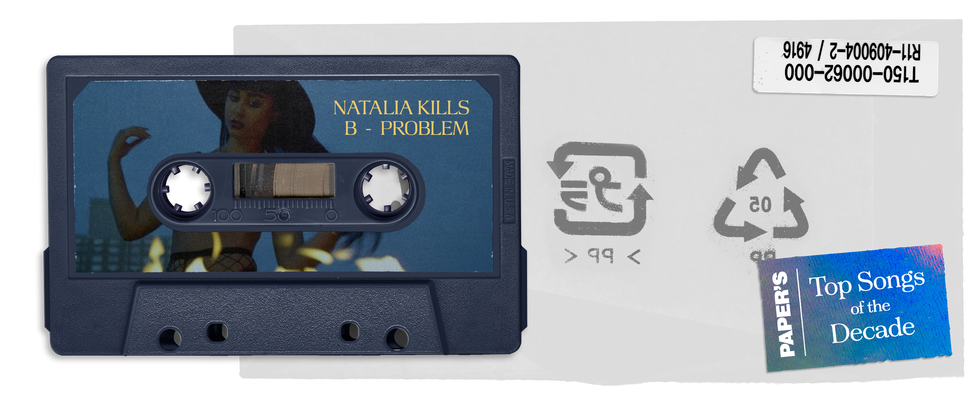
This decade birthed Natalia Kills, and then erased her entirely from the internet a few years later. A victim of cancel culture, which we normalized in the 2010s, the dark-pop star was forced to change her name to Teddy Sinclair when an appearance on The X Factor instantly destroyed a career she'd spent years building (more on that, here). Everything she'd released up until then was ambitious and disruptive: 2011's Perfectionist with themes of suicide, murder and money, all wrapped into left-field synth-pop; and 2013's Trouble, which solidified her reputation as a bad girl chasing controversy... and Marlboro Lights. Her sophomore album single, "Problem," produced by Jeff Bhasker (Lana Del Rey, Kanye West, Rihanna), is a mission statement for Kills' brief, but potent brand. It rattles like a Harley exhaust pipe, pounding with searing guitars and a bassline that could get you evicted. "That girl is a problem," Kills repeatedly warns, and she was absolutely right. — Justin Moran
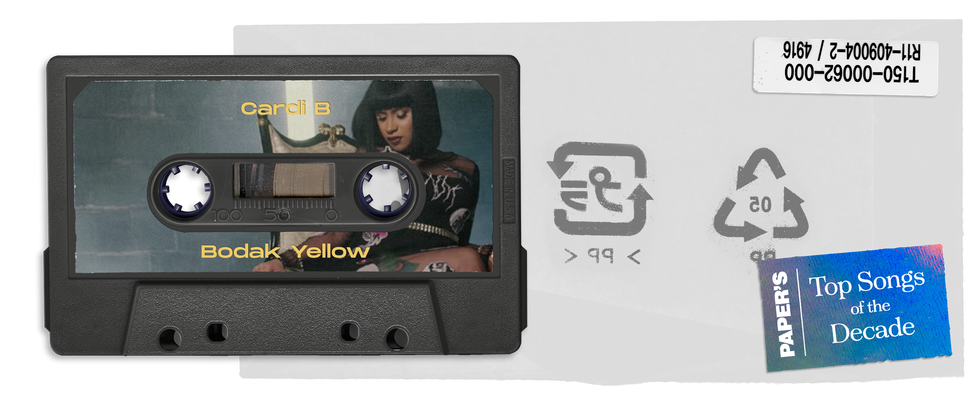
If you didn't hear "Said lil' bitch, you can't fuck with me if you wanted to," shouted by every single person in 2017 at some point, you probably never left your house. Cardi B's explosive "Bodak Yellow" not only launched her career well beyond the stratosphere, but it remains the hit to beat for rappers everywhere. With a flow inspired by her then-industry peer, Kodak Black, the song is bragadocious and targeted. Cardi's sharp-as-nails tone was enough to evoke a performance from those singing along in the club. Fingers were pointing, voices were shouting, and the pure trap bliss was broadcasted on every Snapchat story in America. — Brendan Wetmore
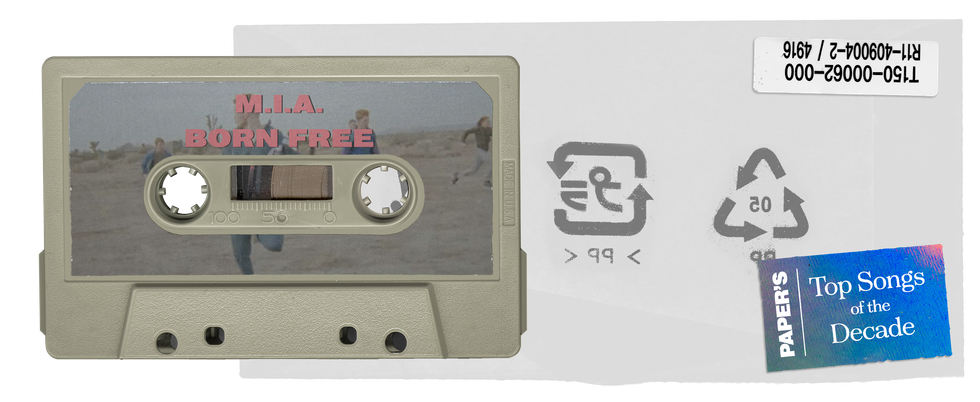
Everything about M.I.A.'s career has felt like a rebellion, from the way she introduced now-popularized genre mashups to her polarizing performances and political views. By 2010, she announced plans to retire from music and start a family, but turmoil was brewing in her native Sri Lanka, where she once fled at the height of Civil War before age 11. The year prior, M.I.A. tweeted that the Sri Lankan government had killed 50,000 Tamil civilians within a five-month period, and "Born Free," with its abrasive punk-rock sound and driving Suicide sample, leaked online. The track was a no-holds-barred condemnation of the mass killings, some of which had been filmed on iPhones by the Sri Lankan Army. Without her label's knowledge, M.I.A. made a bloody nine-minute film for "Born Free," depicting genocidal violence against redheads as a way to channel her fury. The video was briefly banned in the U.S. and the UK. Only in retrospect, like most impactful art from the decade, has "Born Free" grown in appreciation. Genocide and other forms of state-sanctioned violence against "the other" (like ongoing ICE raids under Trump's administration) remain global human rights issues. Nowadays, it's not brave or subversive to sound the alarm on crimes against humanity — it's just the right thing to do, and M.I.A. was doing the right thing years before it was cool. — Michael Love Michael
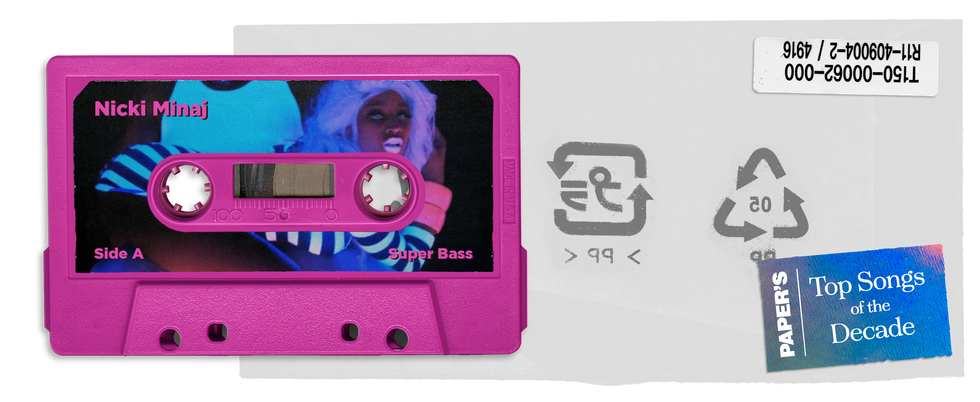
Nicki Minaj's "Super Bass" started the decade off on a note that can only be considered industry-changing in retrospect. An almost perfect blend of hyperpop tropes and Minaj's clever raps, the song's immense impact hinged on a moment in time that was pre- "Feeling Myself," pre- "Boss Ass Bitch," and inherently pre-Minaj. Her Queen of Rap title followed soon after "Super Bass" — originally a bonus track on the deluxe version of her debut album Pink Friday — hit the charts. The chorus is like listening to the color pink; vibrant beyond belief, "Super Bass" will forever be remembered for its earworm-y boom ba doom's and bubbly synth pops. — Brendan Wetmore
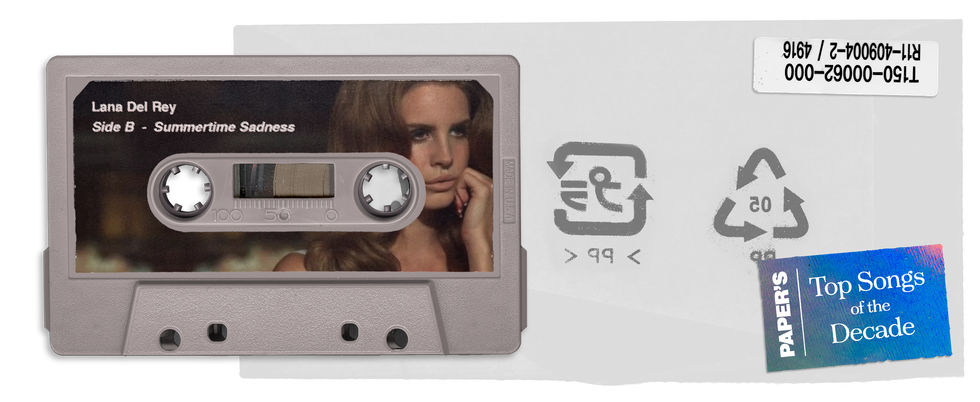
Lana Del Rey turned herself into an art exhibit, a noir film, a comic strip, a collage of every cliché about femininity. At first, it just seemed like good cinema (albeit from someone who still refuses to admit they're playing a part). But looking back, Lana was doing much more than entertaining. Women from Billie Holiday to Amy Winehouse have been singing about the malaise of womanhood forever, but Del Rey allowed women to recoup and cash in on their own pathologization. The way she did it was messy, indulgent, inconsistent, gratuitous and sometimes went too far. But her music was radical and necessary at a time when young women were valorized for happy, healthful confidence, and punished for anything else. Lana made anthems for girls who felt like problems. It's no coincidence both Billie Eilish and Taylor Swift will tell you Lana is their number one. "Summertime Sadness" was her manifesto: a cliffside car chase of a pop song, in which Lana races against her own boredom and despair. She builds from a plea for affection ("Kiss me hard before you go") up to sinister satisfaction ("I know if I go/ I'll die happy tonight"). When she pauses to look out over the California hills on the inescapable chorus: "Got that summertime/ S-s-s-summertime sadness," it's not a confession, it's permission. — Jael Goldfine
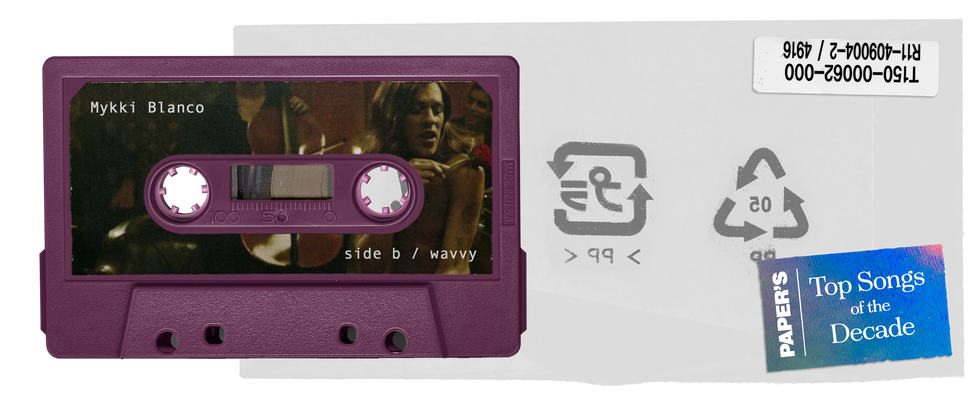
Mykki Blanco changed everything this decade, upending outdated ideas of gender, helping spark — and then eradicate — the "gay rap" trope, and ultimately transcending her underground New York roots to collaborate with stars like Kanye West, Teyana Taylor and Madonna. In 2012, Blanco kicked things off with her Cosmic Angel mixtape, featuring career-defining cuts like "Haze.Boogie.Life," "Kingpinning," and the undeniable Brenmar-produced "Wavvy." The music video for "Wavvy" is something of a cultural timestamp, with cameos by queer NYC legends like Macy Rodman, Melissa Burns and Jasmine Infiniti. Blanco flips between hyper-masc and hyper-femme presentation, which she's done throughout her career, and invites listeners in at their own risk: "Welcome to hell, bitches/ This is Mykki Blanco/ New World Order motherfucker, follow pronto." — Justin Moran
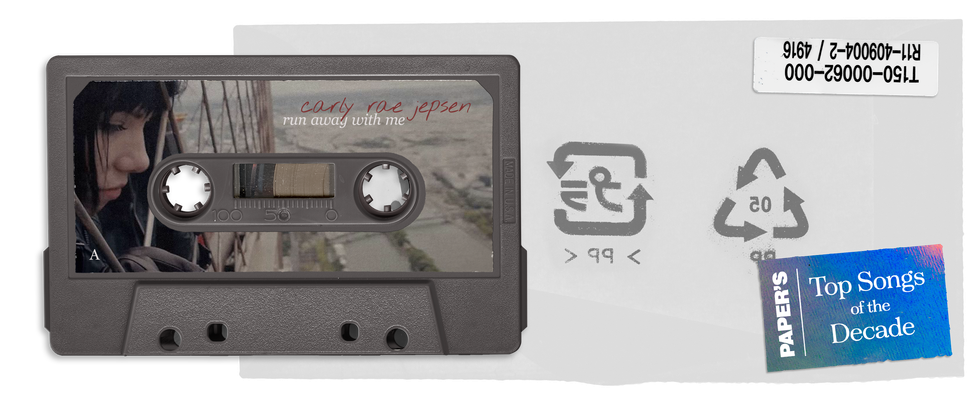
If you close your eyes, you can hear that iconic saxophone solo as clear as day. The opener to Carly Rae Jepsen's critically celebrated album, Emotion, "Run Away With Me" marked the moment that Jepsen stopped being referred to as the "Call Me Maybe" girl and made every Mac Demarco-stanning indie bro realize that it was cool to like pop. Coated in a decidedly '80s sheen, "Run Away With Me" indulges in nostalgia while not losing itself in it. Thrumming basslines and shimmering synths sweep us up in a rapturous euphoria as Jepsen's vocals soar atop. "Baby, take me to the feeling..." Overflowing with giddy, bright-eyed optimism and the promise of romantic escape, Jepsen extends her hand and asks us to escape with her to a world where possibilities seem endless. — Matt Moen
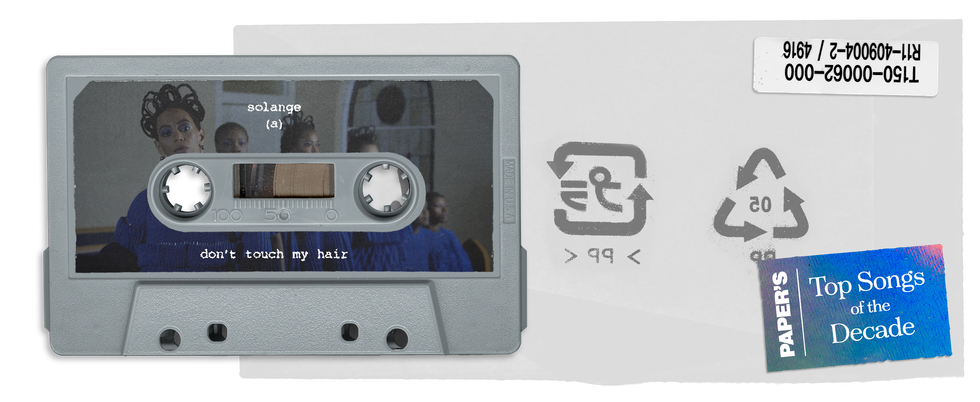
"What you say to me?" Solange and Sampha sing, eyebrows raised, on A Seat At the Table's "Don't Touch My Hair." The line, delivered with an almost tossed-off directness, is aimed at white people who consistently perform microaggressions toward Black people — everything from unwanted petting to condescending comments about linguistic fluency around identity and experience. The laidback, horn-filled groove is one profound statement of many on Solange's 2016 opus, each in their own way affirming the value of Black feelings, Black ownership, and Black life — a true hallmark of the last 10 years. This song goes far beyond hair, though. The hair is one piece of a bejeweled crown, as Solange sings, and depending on how it's worn, becomes an expression of pride and historic regality. Whole legacies come with each crown that truly can't be erased: "They don't understand what it means to me/ Where we chose to go, where we've been to know," Solange sings, her voice swooping from falsetto to the pit of her gut, where the song's strength and potency is derived. No matter what a white person tries to do to strip her power, Solange knows her soul remains untouched. That there is hers, and this one's for us. — Michael Love Michael
As chosen by Justin Moran, Michael Love Michael, Jael Goldfine, Matt Moen, and Brendan Wetmore
MORE ON PAPER
NSFW
Emily in LELO-Land: Your Fave Luxury Toy Brand and Your Fave Fashionista Unite
Story by Zandile Blay